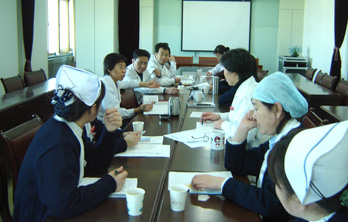In the past few years, Dr. Baowen Feng, with 22 years of clinical experience in gynecology and obstetrics, has rarely had the chance to practice medicine.
Occasionally, when Beijing’s Tongzhou District Women’s and Children’s Hospital is particularly swamped, she will don her white coat for half a day or so. But even without it on, she is a highly respected figure in the hospital. As vice president of community healthcare, she oversees community healthcare management for the entire Tongzhou District.
Initially, she hadn’t wanted to leave her clinical work to step into the hospital’s administrative realm. “But the other doctors chose me,” she says. “Democracy.” If given a chance, she says, she would go back to the clinic.
Providing management training for Chinese healthcare administrators like Feng is the goal of the 10,000 Women Yale-Tsinghua Certificate Program in International Healthcare Management, a four-year program begun in 2009 and funded by Goldman Sachs.
In America and other Western countries, hospital administrators typically do not have a medical degree in addition to their management training. In China, though, healthcare practitioners have long juggled multiple identities. Lacking a profession of lay hospital administrators and even colleges offering hospital administration degrees, some Chinese physicians have been saddled with the responsibility of managing these complex institutions. And while some continue to balance clinical and administrative duties, many abandon the application of their valuable clinical expertise altogether.
For 11 years prior to taking her new role as vice president, Feng served as head of her department, a position involving direct organization of clinical work. Many hospital managers are promoted from senior medical staff as a result of their capabilities as clinical practitioners: often surgeons, as they are the top of the class in their medical skills. At 38, Huiyan Ma, a heart specialist in internal medicine at the Shandong Penglai People’s Hospital, has also stopped her clinical work. But she’s not too concerned. “I’m pretty young,” she says. “I can always go back.” Like Feng and Ma, many hospital managers see their tenure as short-term, which it may very well be.
A survey of more than 300 hospital managers at all levels across three major teaching hospitals in China revealed that none had formal training in hospital administration. Another survey found that while the managers recognized healthcare problems in China, they saw an important part of their jobs as promoting biomedical clinical research; very few recognized the role of understanding theories of organization, management, and leadership. Both surveys were published in 2000 in the Asia Pacific Journal of Human Resources.
As pressures mount to provide cost-effective, accessible and quality care for the nation’s 1.34 billion people, the Chinese Ministry of Health has recognized the importance of having trained health management professionals and have begun to establish short-term training centers in many cities, though the curriculum of such programs has been debated.
Sometimes that responsibility has fallen upon foreign entities. The 10,000 Women Yale-Tsinghua Certificate Program in International Healthcare Management is one such collaborative effort.
Twice each year over a four-year period, a group of about 65 women hospital managers are selected as scholars for the three-week program. Almost all came from some kind of clinical background, but are now presidents, vice presidents and directors of major healthcare centers. The scholars take two weeks of management courses ranging from “A Comparison of the China and U.S. Healthcare Systems” to “Hospital IT.” Armed with these analytic tools, they then go back to their hospitals to implement individual four-month-long administrative projects. They later reconvene for one week to present their results.
Past projects have included setting up performance evaluation systems whereby points are assigned to specific tasks for specific hospital roles, thereby increasing hospital efficiency; reducing post-partum cervical hemorrhage rates by simply doing more check-ups, thereby significantly decreasing morbidity rates; starting heart disease prevention programs through community classes; and building analytical measures and systems to detect trends in clinical care and service, with the ultimate goal of improving quality.
Post-program surveys show that, on average, participants have rated themselves higher on such skills organizational dynamics, teamwork and leadership — with all participants experiencing an increase in at least one competency area.
Martha Dale, director of China Programs for the Yale Global Health Leadership Initiative and an instructor in the Yale-Tsinghua program, was often surprised at how much the women already knew from experience alone.
“They are practicing in a different cultural context, their terminology is different, and much of what they employ as strategies for management is honed from on-the-job learning,” she says. “We help the women practice leadership with confidence grounded in the study of management techniques.”

Recent participants in the 10,000 Women Yale-Tsinghua Certificate Program in International Healthcare Management. Image credit: Yale University.
While the 10,000 Women Yale-Tsinghua Certificate Program in International Healthcare Management may hone participants’ understanding of the art and science of healthcare management, some participants say their years of practicing medicine also make them better administrators.
For Feng, occasionally stepping back into her doctor’s coat — sometimes a necessity when her 30-member staff is handling 8,000 births per year — helps her as an administrator understand what the patients and doctors really need on the ground. “We all went through arduous training,” she says of their collective hospital experience. “I’m not some administrator who’s this higher-up figure from the beginning. They think I can understand them.”
“Yet only when this understanding is then layered with sharp thinking and authority can efficiency be achieved,” says Yu Liu, program manager of Yale-Tsinghua program. “Changes are happening in the way Chinese manage their hospitals. Nevertheless, change is slow, but we need to think big, start small and act quickly.”
— By KangLei Wang ’11, and Martha Dale, director of China Programs for the Yale Global Health Leadership Institute.
*Source: Yale University.

